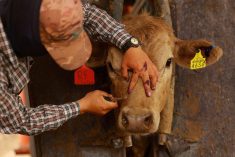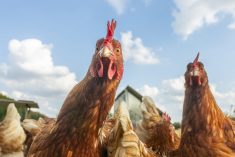Financial support for Ontario farmers to make fuel from the gases in their manure and crop residues has resulted in 12 such projects being approved in the province so far.
The provincial government on Friday reported 12 projects had been approved for construction with funding through its Ontario Biogas Financial Assistance Program, which has also approved 46 feasibility studies in the past year.
The program, funded to $11.2 million, helps farmers and rural businesses study the feasibility of installing biogas systems, with up to 70 per cent of eligible study costs to a maximum $35,000.
Read Also

U.S. livestock: Cattle strength continues
Cattle futures on the Chicago Mercantile Exchange were stronger on Friday, hitting fresh highs to end the week.
It also covers up to 40 per cent of construction and implementation costs. An applicant can get up to $400,000 in total feasibility and construction funds for an anaerobic digester project.
As an example, the province in a release Friday profiled Mark Donnan of Donnandale Farms near Stirling. Donnan, one of the first applicants to the program, is scheduled to complete a project using organic materials produced both on and off the farm, by September 2009.
The Donnans’ anaerobic digester, once fully functional, is expected to generate about 500 kW of power, 24 hours a day, seven days a week. That’s enough energy to supply roughly 400 households, the province said.
Anaerobic digestion is a biological process in which micro-organisms break down organic matter like manure, crops, crop residues and food processing waste. This process occurs in the absence of oxygen and results in the release of biogas. Like natural gas, it can be used as a fuel in electrical generators, engines, boilers and burners.
Anaerobic digestion in that way helps reduce greenhouse gas emissions, the province said, and also treats manure and other organic materials to make them more environmentally friendly.
“Using biogas to generate heat and electricity on the farm is a prime example of possibilities that can be realized when we support innovation,” Agriculture Minister Leona Dombrowsky said in the province’s release.















